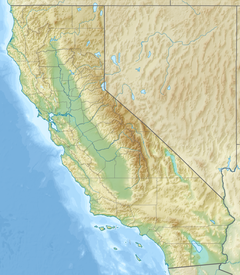| Night Cap Peak | |
|---|---|
 South aspect, from Sharon Lake South aspect, from Sharon Lake | |
| Highest point | |
| Elevation | 10,641 ft (3,243 m) |
| Prominence | 481 ft (147 m) |
| Parent peak | Peak 11220 |
| Isolation | 1.15 mi (1.85 km) |
| Coordinates | 38°18′29″N 119°41′28″W / 38.308°N 119.691°W / 38.308; -119.691 |
| Naming | |
| Etymology | Nightcap |
| Geography | |
  | |
| Location | Emigrant Wilderness |
| Country | United States of America |
| State | California |
| County | Tuolumne |
| Parent range | Sierra Nevada |
| Topo map | USGS Sonora Pass |
Night Cap Peak is a 10,641-foot-elevation (3,243 meter) mountain summit located in Tuolumne County, California, United States.
Description
Night Cap Peak is set along the boundary of the Emigrant Wilderness on land managed by Stanislaus National Forest. The peak is part of the Sierra Nevada mountain range and is situated 2.6 miles northwest of Leavitt Peak, and three miles west-southwest of Sonora Pass. Topographic relief is significant as the summit rises over 4,400 feet (1,300 meters) above Kennedy Meadow in three miles. Precipitation runoff from this mountain drains into Kennedy and Deadman creeks which are tributaries of the Middle Fork Stanislaus River.
Etymology
The peak was named "Night Cap" in the 1890s by the USGS, presumably because of its resemblance to a nightcap. The landform's present toponym was officially adopted in 1979 by the U.S. Board on Geographic Names.
Climate
According to the Köppen climate classification system, Night Cap Peak is located in an alpine climate zone. Most weather fronts originate in the Pacific Ocean, and travel east toward the Sierra Nevada mountains. As fronts approach, they are forced upward by the peaks (orographic lift), causing moisture in the form of rain or snowfall to drop onto the range.
Gallery
See also
References
- ^ United States Board on Geographic Names (1980), Decisions on Geographic Names in the United States, List 7904, Department of the Interior, p. 3
- United States Geological Survey topographical map - Sonora Pass
- "Night Cap Peak, California". Peakbagger.com. Retrieved 2022-07-31.
- ^ "Night Cap Peak - 10,641' CA". listsofjohn.com. Retrieved 2022-07-31.
- "Night Cap Peak". Geographic Names Information System. United States Geological Survey, United States Department of the Interior. Retrieved 2022-07-31.
- Erwin G. Gudde (1969), California Place Names: The Origin and Etymology of Current Geographical Names, Third Edition, p. 222
- "Climate of the Sierra Nevada". Encyclopædia Britannica.
External links
- Weather forecast: Night Cap Peak


